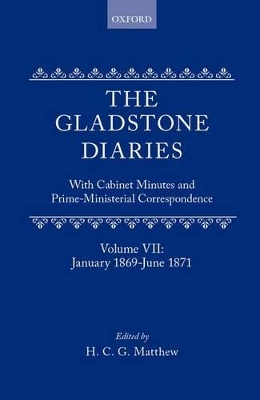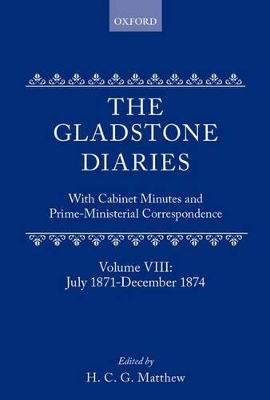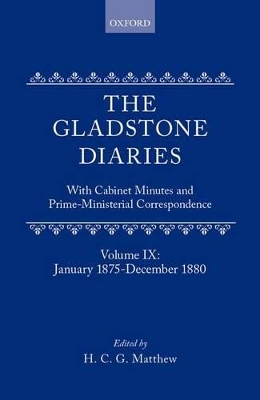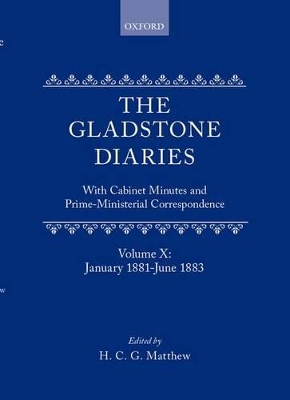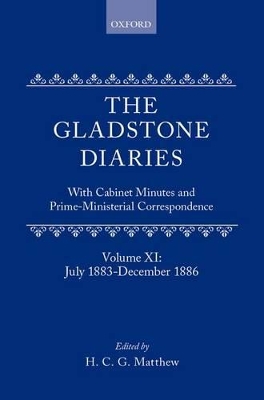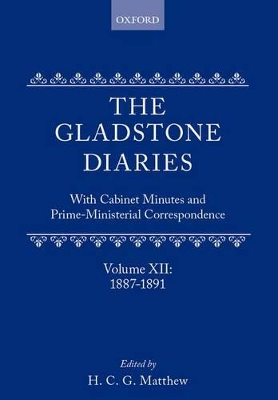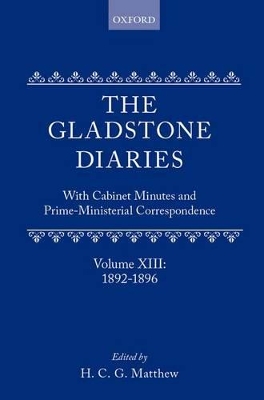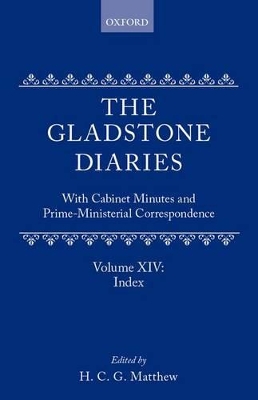The Gladstone Diaries
8 primary works
Book 7
Book 8
Book 9
Book 10
in policy and more consistent in practice than is often realized. Gladstone's third administration in 1886 attempted to pacify Ireland by granting Home Rule and in doing so provided one of the most exciting and controversial twelve months in British politics since the Civil War.
These volumes include not only the daily text of Gladstone's private diaries (maintained almost without a break) but also all of his Cabinet Minutes, hitherto unpublished and themselves a remarkable, and for the Victorian period, unique diary of decision-making. There are over 1400 of the letters (the vast majority hitherto unpublished) which he wrote in those years. These letters flesh out the daily diary and the Cabinet Minutes, and cover the Church, the Queen and the Court, literature,
theatre, art, and domestic affairs. There is much material in these volumes on Gladstone's unsuccessful but repeated attempts to retire from political office.
The volumes offer an extraordinary narrative of great force, a remarkable mixture of achievement and disappointment, of bold legislation and administrative and political disasters. They display some of the innermost thoughts of an astonishing political personality which mesmerized contemporaries and has continued to fascinate historians and general readers.
Book 11
The volumes include not only the daily text of Gladstone's personal diary for these years, but also the minutes that he kept of his Cabinets - over 250 in these volumes - and over 1400 of the letters on politics, religion, literature, and personal affairs which he wrote in these years.
The editors long introduction offers an interpretation of this remarkable material and in itself constitutes an important contribution to our understanding of Victorian Britain. The governments of the 1880s are the most controversial of Gladstone's career. These two volumes - both in the quality and the quantity of the material they contain - vastly increase our knowledge of late-Victorian government and politics and will be an essential source for many generations of historians.
Book 12
contained in the daily diary enteries, the minutes of the Cabinets of the 1892-4 government, and the five hundred letters which accompany the enteries for the governmental period.
Gladstone's life-style made few concessions to his age: his reading, writing, theatre-going, and trips abroad continue, as do his speech-writing and his church-going. His declining eyesight eventually curtailed his reading and led to the end of regular diary-writing in 1894. His vast diary, which he began in 1825, ends in 1896. Its final entries are a moving conclusion to one of the most remarkable and one the most curious documents of British history.
Book 13
contained in the daily diary entries, the minutes of the Cabinets of the 1892-4 government, and the five hundred letters which accompany the entries for the governmental period.
Gladstone's life-style made few concessions to his age: his reading, writing, theatre-going, and trips abroad continue, as do his speech-making and his church-going. His declining eyesight eventually curtailed his reading and led to the end of regular diary-writing in 1894. His vast diary, which he began in 1825, ends in 1896. Its final entries are a moving conclusion to one of the most remarkable and one of the most curious documents of British history.
Book 14
First `Dramatis Personae', a list of the 20,500 people mentioned by Gladstone in his diaries.
Secondly `Gladstone's Lifetime Reading', a bibliography of the 20,000 books, pamphlets, and articles, whose reading he records in his diaries, with the dates when he read them. This is a bibliography of remarkable cultural interest. It is probably the most ambitious attempt by a public figure to note his or her reading and it is certainly unique as a printed record of the lifetime's reading of am eminent Briton.
Thirdly, a `Subject Index' which is the reader's most direct way into the extraordinary range of subjects covered in the thirteen text volumes. It is effectively an index to most of British public life from 1830 until 1896. About two hundred of the people who figure most prominently in the diaries are included in the Subject Index (in addition to the `Dramatis Personae') with detailed analytic entries. It also includes a bibliography of Gladstone's own writings as he recorded them in his
diaries.
This is a culmination of H. C. G. Matthew's acclaimed edition of Gladstone's diaries, correspondence, and other papers. It is an invaluable reference tool and an essential key to a magisterial work of scholarship.
